
OTHER TOP RATED ARTICLES: HOW HEALTHY IS FOOD IN THAILAND
ALL YOU NEED TO KNOW ABOUT DRINKING WATER IN THAILAND
CONTENTS
I. Sources and purification methods of water in Thailand
II. Water outlets and brands of bottled water
III. Differences between brands
IV. Risks
V. Conclusion
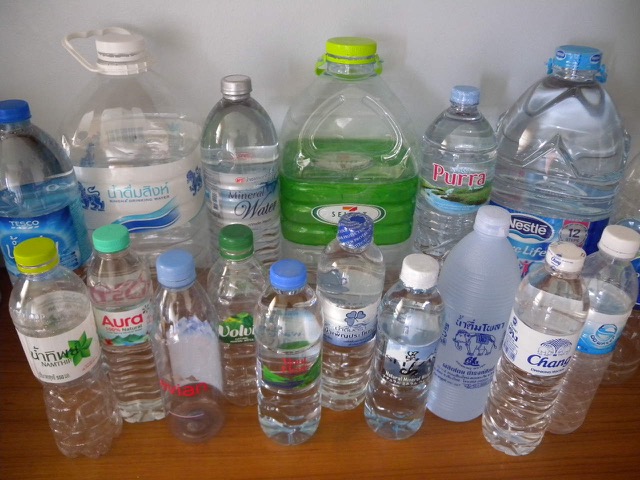
A selection of all kinds of diffferent brands and types of bottled water in Thailand
When it comes to drinking water, some people prefer to just stay ignorant and see 'water' as water, but if you're a bit health-conscious you'll want to know better. I never understood that, the human body is made up of about two thirds of water and the quality of your daily intake matters a lot. Health experts recommend to take in at least 3-5 liters during the day, so it's an important part of what goes through your throat every day.
Besides that, there can be distinct differences in taste and odor, so besides the health aspects of your water intake, it can be worthwhile to find out more about the best water for you just because it tastes better (although not everybody is able to distinguish that).
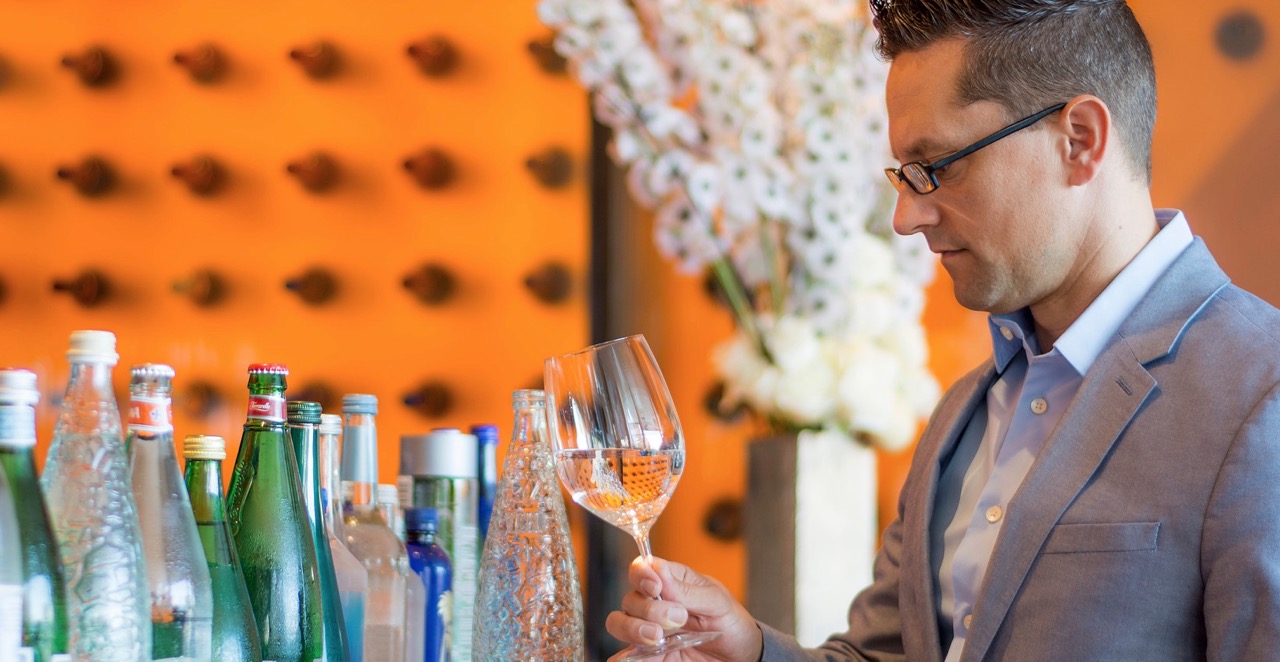
Martin Riese, the world's foremost water driking expert (water sommelier) would disagree with you that water is just water and it all tastes the same. He can distinguish the taste of many different kinds of water.
Source: https://www.martin-riese.com.
Overall, chances you'll get sick from taking in the 'wrong' water are small, but if you stay in Thailand long-term it can be worthwhile to be aware of differences in water quality that you get from different sources, especially in Thailand. You may experience some effects to your health if you keep taking in water from certain sources on a long-term.
Without becoming too technical, here's an overview of what you should know.
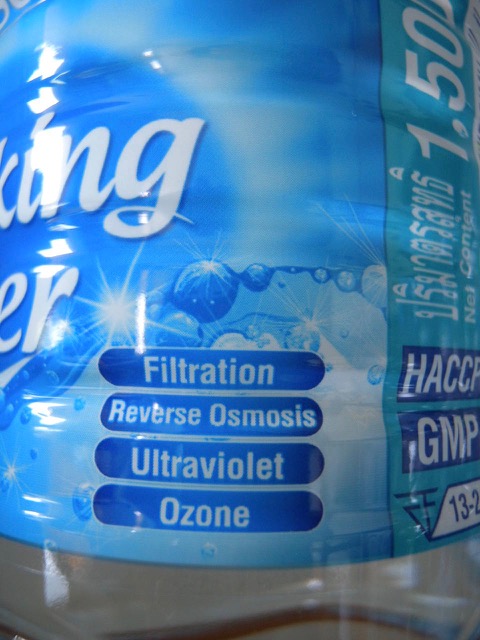
Most popular purification methods of water in Thailand
Unlike in many developed countries, tap water in Thailand is generally considered not potable as such, although you can safely brush your teeth and steam rice with it. Some local people boil tap water and cool it down to drink it later, but that's not recommendable.
According to the Metropolitan Waterworks Authority (in Bangkok), tap water is in fact potable, but I wouldn't take the risk. Also, chlorine is added to the water before it enters your tap. Boiling the water may help to make the chlorine evaporate. Nevertheless, if you use tap water for cooking food, steaming rice and so on, you may experience a chlorine smell, so in that case you can consider using other kind of (cheap) water.
In Chiang Mai, it's not clear whether tap water is treated in the same way, but I'd rather refrain from it.
There is some unclarity about the existence or addition of fluoride to tap water in Thailand. According to our sources, fluoride is not added to tap water on purpose, but in certain areas, particular in the mountains, there is naturally more fluoride in the water than elsewhere. An excess of fluoride in the water can have detrimental effects on teeth especially during the phase of growth.
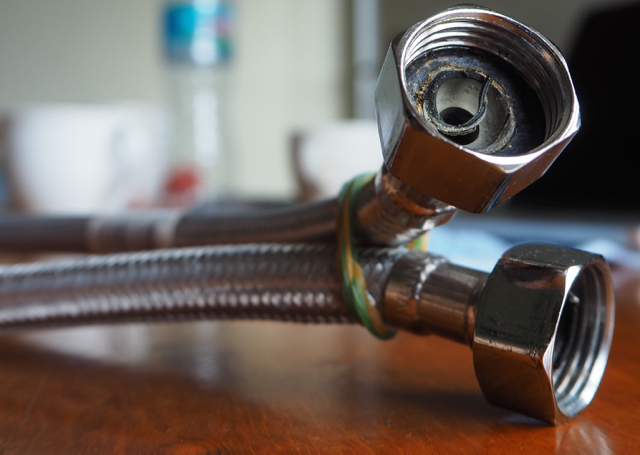
Rubber rings inside water hoses in Thailand wear out every few years for mysterious reasons.
The rubber rings are locked inside where the hoses connect to water heaters, so what possible reason could there be for them to wear out over time? Some suggest it's because of chlorine and other pollutants in tap water.
Some houses have access to a water well in the garden or so and some local Thai people simply boil the water to drink after cooling, but others only use to for other purposes but not drinking. Ground water can be fairly clean but then nobody is checking the quality so nothing is sure.
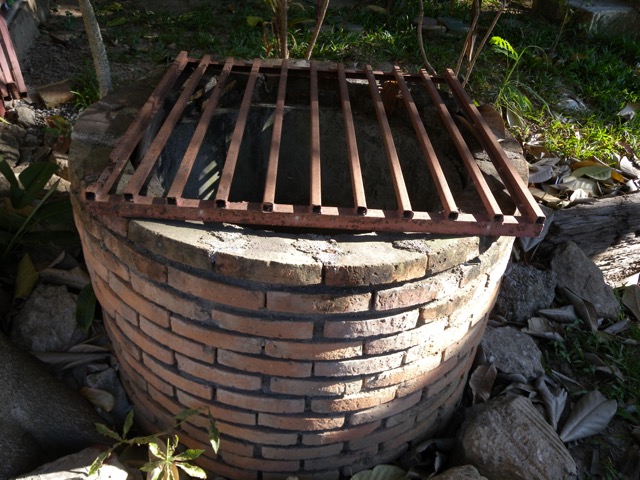
A ground water well
If you stay in Thailand for a long time, it may be worth the investment to get one of the many filtration systems you can install to your water supply pipes, usually under the sink, to filter water to the extent that you can drink it. Filtration systems aren't cheap, but over time you'll save yourself the money and time going to the shop carrying large bottles of water. You can get a filtration system from a DIY store like Homepro from about 4,000-10,000 baht, it depends how many filter are included.
Most filtration systems work with a combination of filters, for example carbon, sediment, omnipure and other filters. All types sold in Thailand are probably effective, clean and safe enough to use. They mostly work the same, the difference is more in the quality of the filters and membranes.
The most important thing to remember about having your own filtration system in your house, is to replace the filters regularly. You can have a very expensive filtration system but if you don't replace the filters often enough, it becomes dangerous while you're thinking you're drinking healthy water. A cheaper filtration system with filters that you replace regularly is better than an expensive one with filters that haven't been replaced for a long time.
I was told in the shop that if you leave for a holiday of more than 2 weeks, it's better to take the filter out and let them dry in the sun, else they might become a bit smelly and then it's recommendable to replace all filters, which would add an unnecessary amount of about 1,000-2,000 baht to your holiday costs.
You can also get on-top-of-the-counter filtration systems such as eSpring / Amway, which are pretty good, but perhaps a bit expensive. Most filtration systems have about 3-5 filters, the foreign ones are more expensive and the Thai ones are cheaper.
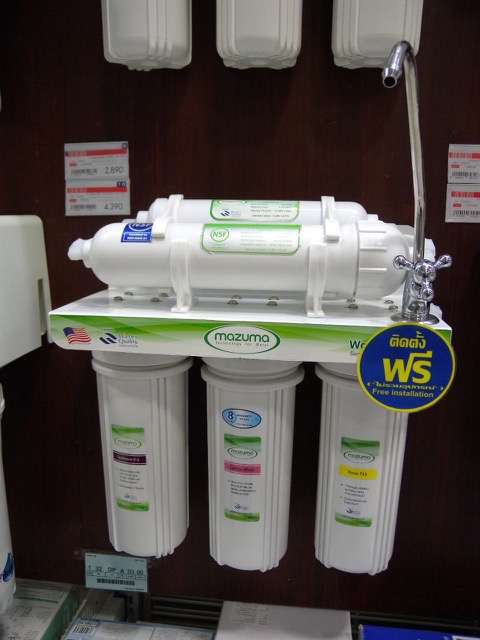
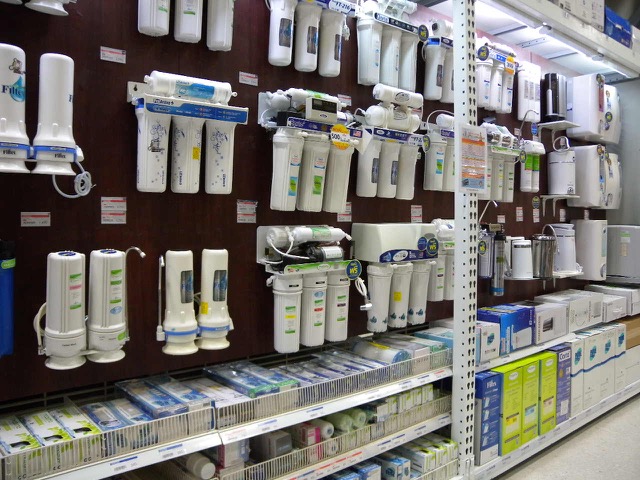
Various water filtration systems for sale in a DIY store in Thailand.
Prices vary from some 4,000-11,000 for a system with 1-5 filters
Bottled water in Thailand comes in so many different brands and types, that at first you may be flabbergasted and not sure which one to choose in the shop, but after you distinguish them in different types it becomes easier to know more about the quality of the water and to make your own, conscious choice.
The pity in Thailand is that producers are not obliged to show the exact source of the water, the exact ingredients and it's exact proportions and even when you call the call-center they are often reluctant or ignorant of such data.
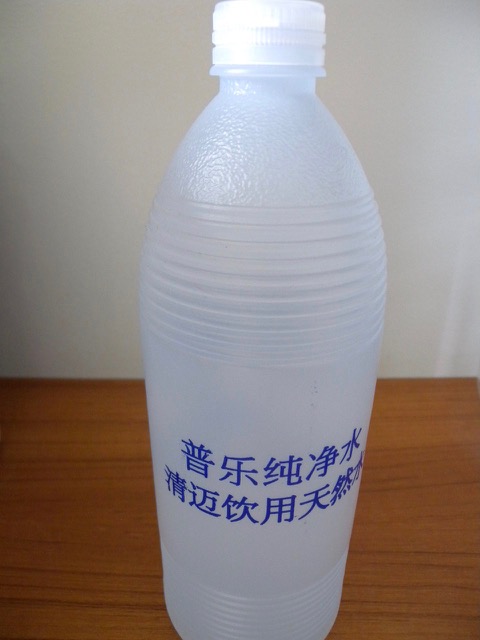
Producers of water are more concerned to put Chinese slogans on the bottle than to display contents
Bottled water in Thailand can be distinguished into a few main types, mainly on the basis of the purification process:
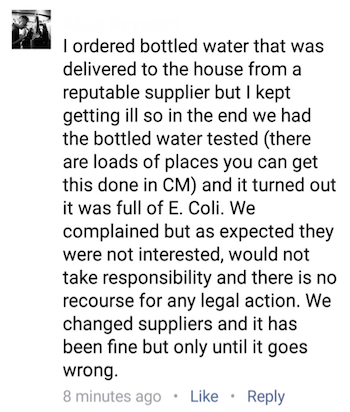
Experiences from users of RO bottled water in Thailand are not always positive
Most of the cheaper potable water available in the market works on the basis of reverse osmosis, in short RO water.
Reverse Osmosis is a filtration process that retracts water through filters and purifies it to clean water. A reverse osmosis membrane will remove impurities and particles larger than .001 microns. This means that most common water pollutants will be rejected, but also most minerals which are good for the body.
There is quite a bit of controversy about the adverse or beneficial effects of reverse osmosis water on our body. Just google the words "RO water" and Google already suggest the most clicked on search results, including "reverse osmosis water good or bad".
Proponents of RO water claim that it is very clean, in fact cleaner than many other kinds of water (purification methods) because the water is (nearly) completely stripped of any minerals and so also of pollutants. And in fact, numerous people are taking RO water as their main water intake for years without any obvious health (related) problems.
At the same time, some sources question how healthy RO water really is for our system and some even claim outright that it's not healthy for the human body. The claimed disadvantages of RO water are mainly:
1. RO water is void of minerals
2. RO water would be acidic
3. RO does not filter all pollutants.
ad 1. According to one source1 RO water is usually slightly acidic, with a pH between 3.0 (very acidic) and 7.0 (neutral) and it also suggests our water intake should be slightly alkalic. Now I don't know if this is true, I'm not a health expert, but I did a bit of research on this topic and found that even if RO water would be slightly acidic, that would not automatically mean that it makes the body acidic. The effect of intake on our body after the digestive process is measured as the so-called PRAL value3. A negative PRAL value means that something can add to the alkaline base of the body, a positive PRAL value that it can add to the acidic base of the body. An acidic body is considered not healthy.
Mind you, eating certain sour stuff does not mean it will automatically make your body acid! Lemons, for example, add to your alkalic base, this is all because of the digestion process.
I asked some nutrition expert on the PRAL value and pH of RO water, the answer was this:
Helen Kollias, PhD,CS CS, Certification Level1 Coaching Team
Precision Nutrition, info@precisionnutrition.com
So according to my info, RO water is nearly pH neutral and does not make the body acidic. From the PRAL value lists you can see however, that mineral water has slightly negative PRAL values, while soda water can have a positive PRAL value, much like many softdrinks. So there is quite a difference between different kinds of water.
ad 2. As for the other acclaimed downside of RO water, that it is void of minerals, if you get enough minerals from daily intake of food, the lack of minerals in RO water should not be a problem. But in extreme cases, for example if you were fastening or going on a hunger strike drinking only RO water, I think there is. Also, if you are doing sports or going on long bicycle rides, RO water won't lessen your thirst because there are no electrolytes no nothing in it.
ad 3. Finally, that some less advanced RO filtration methods do not manage to clear the water of all pollutants (such as chlorine and pharmaceutical residue) might also be the case of other less advanced purification methods.
So overall, I am not sure if there is a scientific base proving that RO water is not healthy for human intake. A seemingly rather serious study by the WHO2 suggests, however, that there are serious health risks related to drinking RO water so that can make you start thinking.
What is probably safe to conclude is that there is some controversy about the health effects of RO water on our body. In the end, everyone has to make his/her own choice about what to believe.
Personally I'm "moderately suspicious" of RO water because of this controversy and because of my personal perhaps holistic or "Asian health perspective". I don't pretend any scientific base for this, so you can disregard this part if you want to.
From my perspective, RO water is very unnatural, in nature there is no such water and by using special chemical techniques to extract one substance from another, the result is an 'unbalanced mix of elements' that therefore unbalances the body. Extract refined sugar from sugar cane and it actually becomes harmful to the body, seen from a Chinese traditional health perspective. The substances that nature gives us are in perfect balance. In the case of for example coconut juice and wine, science knows that they have the same osmotic value as our blood and are therefore easy to absorb by our body. In the case of other substances there is also an energetic balance that science cannot prove yet, but that a lot of eastern approaches long have acknowledged, for example Chinese traditional nutritional science.
For this reason, I believe that RO water is 'out of balance' and so imbalances the body as well. Up to you to believe it or not and to make your own choices.
Many Thai people I know don't drink RO water if they can afford to buy other types, saying that they don't trust RO water or the companies that deliver it. RO water is definitely the cheapest source of drinking water and usually you find them near markets, on streets, or at Thai style apartment buildings. In my experience, most things that are cheap(-est) are usually not of the best quality, but for you to judge on this.
Whatever your opinion about RO water in Thailand, the truth is: you can't avoid it. Whenever you go out for a dinner and ask for some water, chances are very high that you get it because it's the cheapest kind of drinking water (after boiling tap water and cooling it down).
Most of the plastic milky bottles and some of the clear plastic bottles contain RO water.
There are also companies that deliver bottled water to your doorstep, such as Dewdrop, which again is RO water. Dewdrop delivers water in Chiang Mai area in crates of glass or plastic bottles (12 pieces per crate) as well as in big plastic containers (20 liter). The downside of Dewdrop is that often bottles are not thoroughly cleaned, dirt residue remains on the heads of the bottles so if you just use it for drinking this may create a problem. If you boil the water for tea or cooking, it's probably okay.
UV is a type of radation we experience every day in the sunlight, in water treatment special lamps are used.
UV treatment is an effective way to kill most of the harmful micro-organisms in water without using any chemicals. As such, it is environmentally friendly and "better" than chlorine-treated water. Also, UV treatment does not affect the taste or smell of water.
UV treatment is usually an additional treatment after filtration, because the water most be adequately filtered from particles larger than 5 microns so that bacteria cannot shield behind such particles and remain alive during the UV treatment.
Ozone treatment is another, usually additional treatment done to kill all kinds of micro-organisms that remain in the water. There are few disadvantages to this purification method and it doesn't affect smell or taste of the water.
Besides the various kinds of water purified by men, there are several sources of spring or mineral water in Thailand, notably in the North of Thailand (for example from Maerim area). Aura, Mineré, Mont Fleur, Aro and Seizan are examples of mineral water from the North (in particular from Maerim, Tak and Chang Dao).
Mineral water is good for the body when the proportion of minerals is within certain ranges. Unfortunately, in Thailand, it's not always clear what are the contents and proportions of locally bottled mineral water, because it's not always on the bottle.
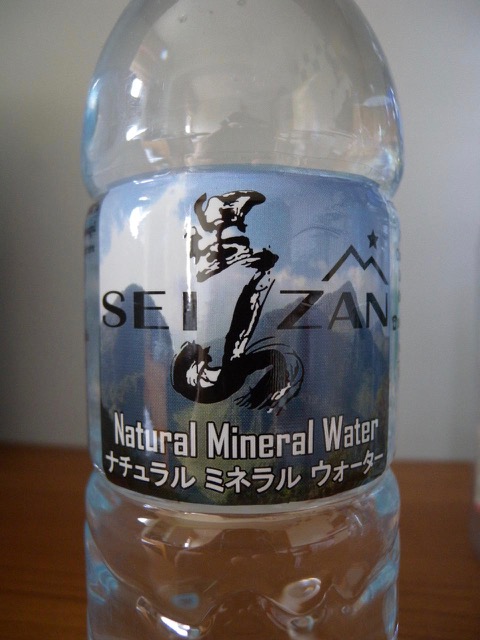
Fancy labels do more to sell than displaying real contents
Some argue that mineral water in Thailand contains too much fluoride, but generally it's within internationally recognized ranges. Questions regarding the health effects of fluor in water may have started internationally since the so-called 'water fluoridation controversy'.
Other purification methods, such as distillation and subsequent addition of minerals ("mineralised water") that you find in other Southeast Asian countries are not popular in Thailand.
Most bottled water you find in the shop that is not mineral water is often purified by a combination of RO and UV and/or ozone treatment. The 'milky' plastic bottles (often sold in a six-pack) are usually only RO treated. Most of the transparent plastic bottles are usually treated with purification methods other than RO, hence they are a bit more expensive, some glass bottles are RO water.
The cheapest way to get RO filtered water is to use the water dispensers on the street, they supply 15-20 liter of water at only 10 baht or so. Compare that to about 36-40 baht for a 5-liter of Singha water and you can calculate the water dispensers on the street can be up to 8x cheaper (!).
But there's no free lunch, not even in Thailand, and the general rule is that what-you-pay-is-what-you-get: the companies that run water dispensers on the street basically connect a water supply line to a RO filtration system so at most what you get is RO water. It's said that these companies are often late to replace filters, so then the water can become unsafe. According to a recent report by the Bangkok Post, Nov 2015, more than 50% (!) of the water dispensers provides unsafe water, mainly because filters are overdue.
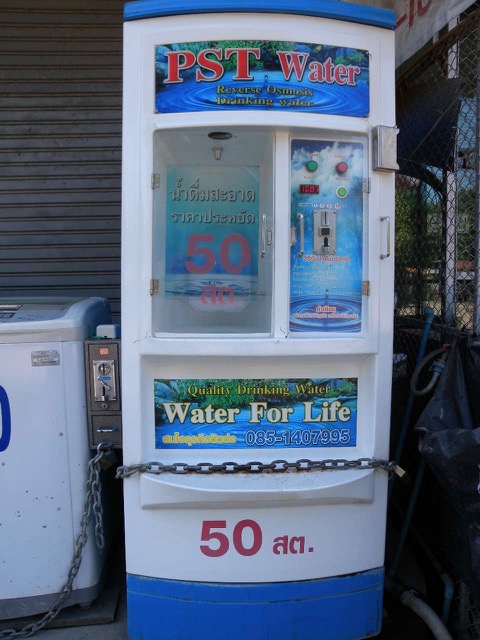
With more than 50% of water dispensers filters overdue,
you're taking some risk to save a few baht on water.
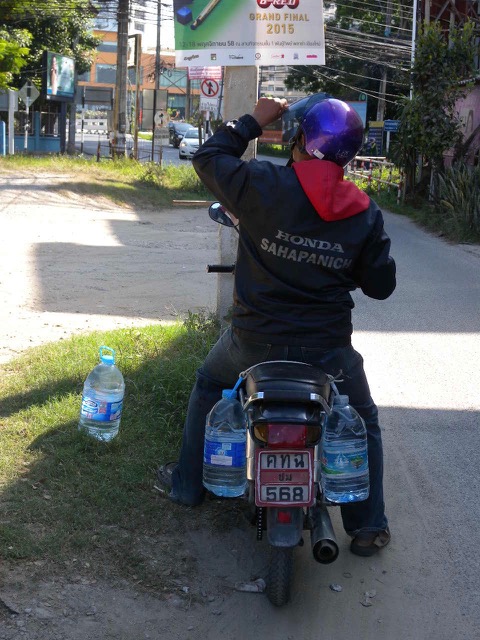
Local just filled up this containers with cheap water from a street water dispenser
The big bottled water companies (except for Dewdrop) have large water purification facilities instead of separate filtration systems everywhere and are more likely to stick to a good standard, so you'll run much less risk with them.
Charlie P.: 'I've got sick drinking from the RO machines. (...) started waking up feeling sick every morning. (...) Then I went to Bangkok for a week, only drinking bottled water, no sickness, then I came back to Chiang Mai and drinking machine, woke up the next morning feeling sick again.' (Source: Facebook)
Some foreigners have discovered such cheap water dispensers on the street and are proud enough to make Youtubes of it, as if even the NSA couldn't figure out where they are and how they work.
Getting water from a street water dispenser is about the cheap source of water in Thailand. There is some controversy about the health benefits of RO water, though, and with street dispensers you risk that the filters have not been changed in time.
While most purification treatments are the same, there are some distinct differences between different brands of drinking water in Thailand. Several of the big brands, such as Chang and Singha drinking water probably started to produce drinking water only because they were not allowed to advertise their prime product, beer, on TV on a large scale. By outbranching into water, besides beer, they could enlarge their advertising presence, and in fact sell more beer. These companies are so large, though, and have good purification equipment, so water from these brands is as safe as it can be in Thailand.
Many 'local' brands are in fact (co-)owned or managed by large international companies, such as Nestle and Coca Cola. Using fancy French names, such as Mont Fleur, suggest that the product is imported, but in fact it's locally produced in Thailand, but then monitoring and certification is by international standards, which is probably a good thing. Some local water in Thailand is certified by national standards.
Also, brands both sell directly under their own name as well as indirectly under another name, for marketing purposes. For example, Purra mineral water is by Singha and Namthip is by Coca Cola.
I've always noticed that Singha water tastes more sweet than other water and moreover it leaves no calcium stain in your kettle after you boil water with it. So I called the call center to ask why. Apparently, Singha water contains all 'normal' minerals you find in mineral water, however the factory takes out those minerals that leave calcium stain (such as Ca). Because the water lacks the 'normal' balance of minerals, it can make the taste seem more sweet.
This makes Singha suitable for boiling water for tea, if you're a tea lover, for example, and you don't want do clean your kettle all the time.
Crystal tastes terrible to my tongue, while Aura and Minera taste okay.
Dewdrop delivers and recycles bottles of water in crates (and large plastic containers) in many condominiums and apartments in Chiang Mai. Some customers report that the bottles aren't really clean after recycling, though.
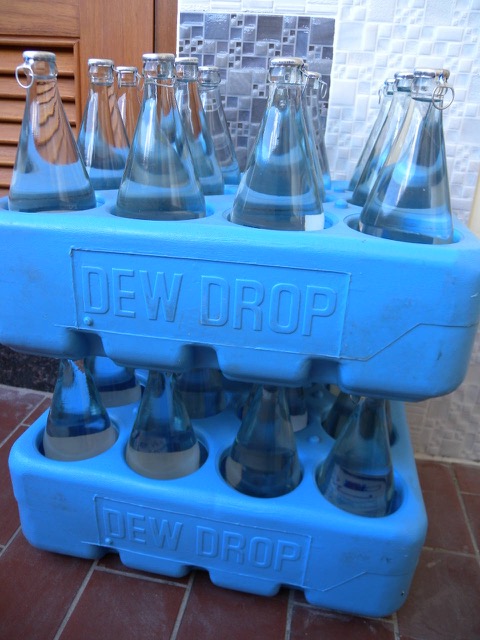
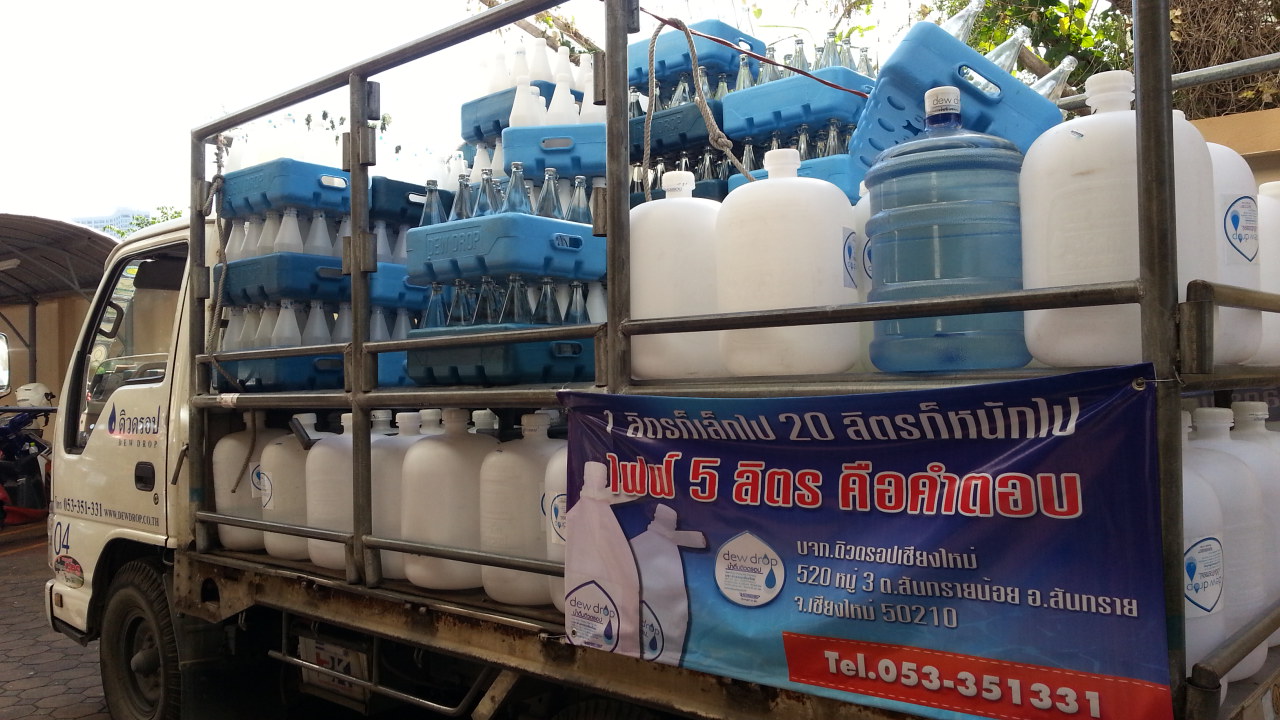
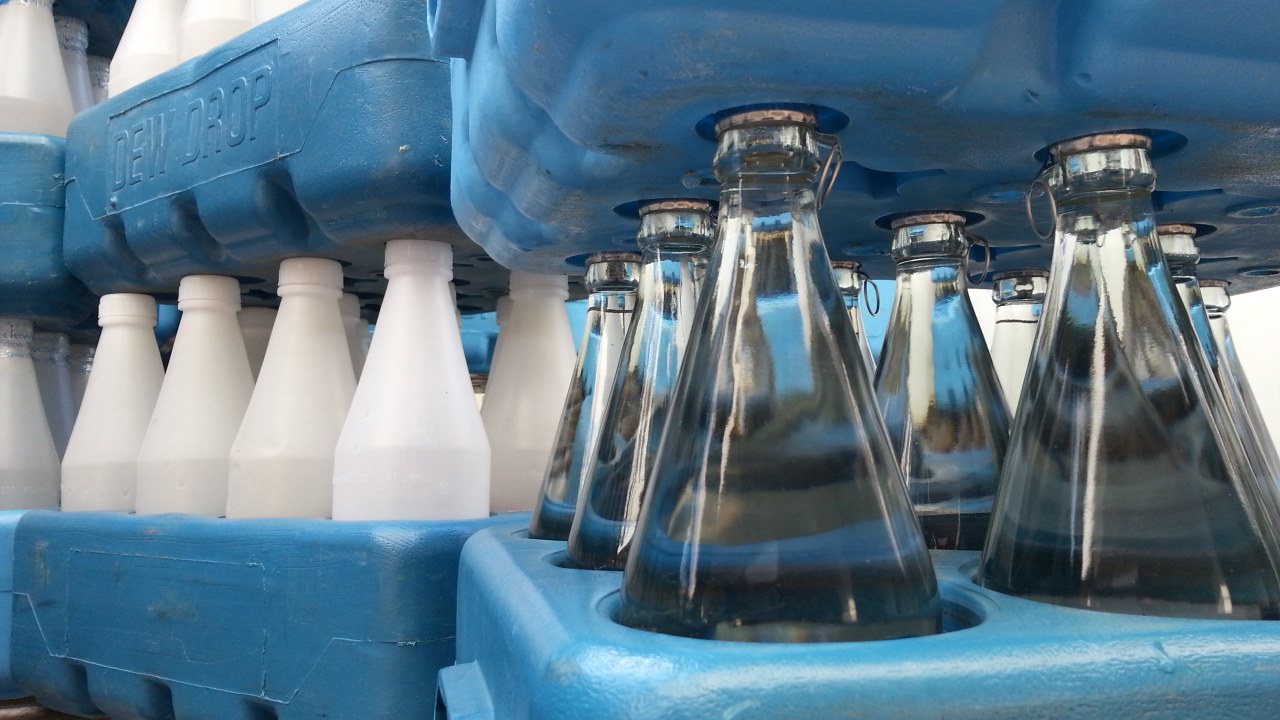
Plastic milky bottles or glass bottles have the same water quality content by Dewdrop
Glacier is a company that delivers water in plastic milky bottles in much the same way as Dewdrop does. Members of CML report that the bottles are fairly clean. Most likely, the water in these bottles is also only RO water.
Crystal (www.crystal.co.th, call center 026 933333) prouds itself of being the first and only Thai company to have received the US-based NSF certification (National Sanitation Foundation) since 2002. It has also won the national FDA (Food & Drug Administration) awards for the maximum of three consequetive years.
The call center confirmed that this is RO water which is additionally treated with UV. So perhaps this company has high standards in cleaning the water, but in the end it's RO water.
Aura is mineral water is bottled from a cold spring in Maerim by Tipco, just north of Chiang Mai. If you're an anti-globalist or you're simply against food moving around the world, this is the brand you should choose to drink mineral water. I find this water to taste slightly strong, so I prefer not to drink only Aura but vary my intake with Minéré, Purra or Mont Fleur. Minéré (by Nestle) is milder in taste, and which is also bottled in Thailand, in Pho Sam Thon near Ayutthaya. Mont Fleur is from a mountain near Phop Phra. Don't be mistaken about the name, it's not French but Thai. Typically, Thai brands like to create the feel of luxury or quality by using European style names.
Imported water is obviously relatively expensive in Thailand. Some brands which are not bottled here, but really imported are: Evian, Volvic, San Peregrino etc.
Several other brands are actually a division of a large international food or beverage company such as Nestle or the Coca-Cola company. Namthip, for example, is by the Coca-Cola company (and is sold in bottles under high internal pressure, suggesting a hard plastic bottle which actually becomes very weak after you open the lid, which I find deceptive). You can feel safe that the water quality is monitored properly, but it doesn't guarantee a good taste or a high quality water content.
Some risks with the hygiene and purity of water can happen especially in the following cases:
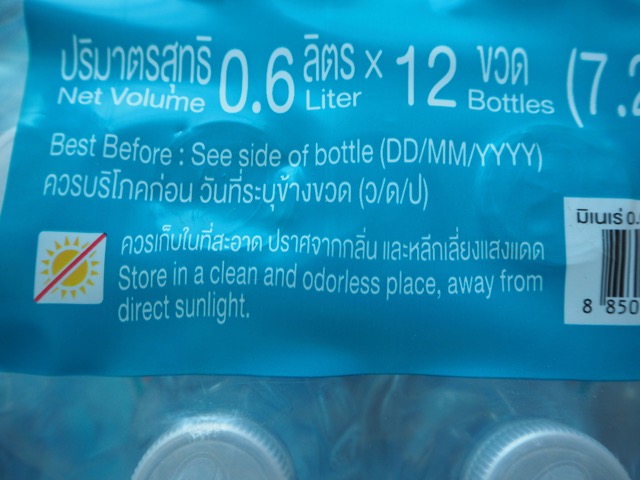
While most drinking water in Thailand is probably safe, it's hard to prove that you got a 'food poisoning' from taking in the wrong type of water. If you're concerned with your health on the long term, it's recommendable to use better quality sources of water. In general, in my opinion, clear plastic bottles are better than milky plastic ones, and the more purification methods used, the better.
Mineral water is good as long as the contents of minerals remains within certain ranges.
Spread the risk of taking a lower quality type of water for too long, by switching brands regularly and take at least some mineral water as water intake away from meals. Since RO water is widespread in restaurants, you'll drink this a lot anyway when you're eating out, so if you want to diversify your water intake, drink mineral water at home.
Investing in your own filtration system makes sense when you stay long term, but you've got to replace filters often enough. If you're not sure, better rely on the big producers of water.
For Chiang Mai Locator by Michael Zhang
References:
Reference 1
Reference 2 (PDF)
Did we leave out something, is something incorrect or do you have something to remark on this article? Share it here as a comment.
OTHER TOP RATED ARTICLES: HOW HEALTHY IS FOOD IN THAILAND
Leave a comment
Note: By posting a comment or question, you will not automatically be notified when other people respond to your post (as in some other social media message threads). Please check the thread yourself if you’re interested in this topic.
| Preston Posted on January 18, 2025 at 11:04:54 former US embassy assignee and thus knew about Crystal so we always use crystal bottled water. Lately I have seen a lot of different news articles about plastics being found in our bodies and itis thought to be from drinking so much water from plastic bottles. I a reverse osmosis system good for use of cleaning plastic particles from bottled water? | |
| Admin Posted on April 19, 2024 at 18:29:16 @Glen: Since Singha water bottles do not show the exact content or mg of minerals on the label (unlike water bottles in other countries), we specifically called one of the engineers of the Singha water factory a couple of years ago and they explained the filtration process. Although it is technically possible to take out all the calcium, it is normal for spa water bottlers to leave a minor amount of calcium in the water for taste purposes. Since Singha water tastes exceptionally sweet, we suspect Singha takes out more of the calcium than other producers. Calcium is not harmful to the human body, only high amounts of calcium create a 'hard' taste of the water, that's one of the reasons why there are so many decalcification devices on the market. | |
| Glen Posted on April 16, 2024 at 13:04:41 Our article states; 'Singha water contains all 'normal' minerals you find in mineral water, however the factory takes out those minerals that leave calcium stain (such as Ca)" Are you certain of this? only Singhas website claims that their water contains calcium | |
| Carl Posted on March 06, 2024 at 08:32:05 How much Chlorine do they put in our tab water? | |
| Joseph Posted on March 05, 2024 at 09:21:53 Thanks for the article, now I understand why I had problems with my skin. What kind of filter do you recommend? | |
| John Arnold Posted on December 07, 2023 at 11:41:38 Fantastic article... and congratulations... "" judging from lots of comments... you've obviously hit on a topic that many of us here in Thailand are curious about. Now I'll search for DIY home filters.. that can make mineral water too? IL start looking | |
| Hans Posted on September 28, 2023 at 05:15:27 Thanks for a good and important to read article! It has got good/useful comments as well, I think. Worth reading through as well. I think I finally found the optimal path for me to get good water. I sort of concluded that any water here is potentially unsafe due to it might have been stored for a long time, and quite possibly a large amount in the sun as well. So I’ve landed on local filtering of water which is already draining water, since that way seems least risk in total. So I have a small food grade tank connected via a water pump to a Stieble Fontaine 7 filter which continuously provide freshly filtered water. The local government have free mineral water for the locals here, so I fill the tank with that about once a week. | |
| Pattaya Guy Posted on April 11, 2023 at 03:02:37 Thanks for the time and effort you expended to create this article. It was helpful for me. As you pointed out, there are seldom any cheap options. It is unfortunate that some commenters feel the need to express their hubris and boast about how much more money than you they have... what jerks some people are! I would love to read a similarly in-depth review on DIY at home filtration options. Thanks again for your efforts. | |
| yes Posted on November 26, 2022 at 08:47:13 would be cool to have an analysis of various brands so to compare them it seems not so costly to do it commercially https://www.aqua.co.th/en/service-laboratory/ eventually could be crowdfunded, I'm definitely in | |
| CM Locator Posted on October 16, 2022 at 07:33:47 @Christopher: A possible explanation for this would be the minor amounts of chlorine that the authorities add to tap water. Watering your plants with filtered water, such as RO water, may be a solution. The lack of minerals from RO water could be compensated by the minerals from the soil. Thanks for your contribution. It suggests that the water the Thai government is supplying through our taps is less clean than rain water | |
| Christopher Posted on October 16, 2022 at 07:17:05 Very well written, however why I came here wad to learn whether tap water can be used for plants? Now I am speaking about exotic plants and advanced growing methods, such as hydroponic growth. During the rainy season my plants are striving and can happily drink unlimited amounts of water. However, once I switch over to tap water they're not showing the same prosperous growth signs as with rain water. Thanks a lot for your input | |
| cmlivin Posted on September 16, 2022 at 07:36:40 This was a suprisingly well written article. Id recommend you to post suggestions of water filtration systems we could use at home to improve our water and especially remove any bpa from bottles, might be a big interest. Im certainly interested and its a jungle! Thanks for the info! | |
| Sunil Posted on June 20, 2022 at 01:49:25 THANK YOU. A life saving article. Since, I landed in Thailand, My health kinda went in a swing, even though I'm from India and Thailand is an upgrade. somehow, it felt same or lower. The culprit was RO system installed in my condo. RO was the culprit, I started taking Aura and with in one day. I could feel the difference. No more headaches in the morning, bloating stomach, feel energetic. WoW...what a difference water makes in ones life. RO is deliberately confusing and it sells expensive purification systems for home. just drink RO for one week in Thailand and natural spring water for another and you will get your answer. Its that simple really. | |
| akine Posted on April 19, 2022 at 05:39:22 i recently moved to thailand from canada where i was getting very high alkaline ph water, fluoride free.. i've been having trouble finding anything at all close to this here. most of the water all have fluoride and the big corporations all control the market. i'm surprised more people are not aware of the water and what they are drinking and how hard it is to find clean high quality drinking water, which everyone should have.. | |
| HARRIS CARR Posted on July 27, 2021 at 04:12:35 Recently was in USA bought a water tester from Amazon and water in the USA tested very good. Even tap water was drinkable. However when I got back to Pattaya Thailand I tested the water like Nestle Smart water by Singhia etc as well as tap water and even uv water filtration system in my condo and all tested unsafe over 250 300 rpm. The filters definitely need changing because I was in USA 5 months. I'm changing them as I write this comment. What's confusing is the bottled water from hotel tested good. I am anxious to test my UV water filtration when the man finishes installing all 4 new filters. In conclusion, the bottled water by Nestle tested very bad. My assumptions are because of businesses lacking customers due to everything shutting down due to covid19 and there by selling less water , the plastic water may sit in hot warehouses for long periods of time making the water test unsafe. 250 to 350 ppip. The same as Thai tap water which has gotten me very sick on several occasions. Please let me know your response. I've lived in Pattaya Thailand 15 years. I started having problems with my stomach when my filtration system accidentally was unplugged for 11 DAYS. Since then my gut is sensitive. BM movement is not normal except when I fast or live on protein bars. I'M USING IN SOLUBLE AND INSOLUBLE FIBER AND IT HELPS A LOT. HARD TO FIND THE INSOLUBLE . It's better for bulking up stool but literature says don't worry. The Soluble is just as good. Makes no sense they work differently. | |
| Andere Posted on March 21, 2021 at 04:12:22 hi is zinga wather safe to drink no bad bakteria fore body and stomak best regards Anders Changrai nice day | |
| Bob Posted on May 11, 2020 at 06:59:29 Hello I am trying with great difficulty to find regular real distilled water in Chiang Mai . Do they not know what that is here? Thanks | |
| Bev Posted on January 20, 2020 at 11:59:40 I have a sever allergy to sulphur/sulfur/sulphites and I'm travelling to Thailand. Is there any bottled water that does not contain these? Most natural spring and mineral waters sold around the world contain these. Coco Cola's Pump water in Australia is safe for me but their Pump water in New Zealand is not. As far as I'm aware there is no purification method for removing sulphur from water. Am I correct? | |
| Paul Posted on January 17, 2020 at 01:24:37 Can someone advise me if you can get bottled water in Thailand which is free of sulphites/sulphur. Allergic to sulphur | |
| Eddie Posted on January 22, 2019 at 09:29:42 What do you think of Singha Purra mineral water. I have been looking in to more alkaline water as its meant to be good for kidney cleaning as I suffer from gout. Tests have shown Purra is approx PH 8.5 (more alkaline) so I am giving it a go | |
| Chemjira Korumpai Posted on September 03, 2018 at 03:24:14 Very Good for your data. | |
| Graham Johnson Posted on August 30, 2018 at 10:17:18 Do you have any information on the use of portable water systems like Grayl personal filter that uses charcoal filters, i.e. for filtering tap water? | |
| Alan P. Posted on February 17, 2018 at 06:38:09 What an interesting but disturbing article. I have been based in Chiang Mai for over 10 years, and my main water intake is boiled (for hot drinks) or frozen (for ice) tap water, otherwise I consume delivered 'PoleStar' water in plastic bottles. I have not generally suffered from stomach problems over these many years. Do I change what appears to work OK for me? Also, I was disturbed to see that many of the comments after the article seemed negative on fluoride content, whereas I'd just been reading other articles about how good it is, for example added to tape water in USA and Europe. As I said, a very interesting and informative article ............. but how to act upon it! | |
| Baantigs Posted on January 28, 2018 at 10:57:53 Article on water very interesting. I don't like the taste of any plain water even in Western countries. IN CM only use filtered water from street to clean my teeth. All other water use is boiled as with cooking and making coffe. Tap water I only use for cleaning. | |
| BKK_James Posted on December 20, 2017 at 09:30:00 Glad to see that you mentioned the risk of using cheap water dispensers to get drinking water. The ones is Bangkok are not safe! A couple of years ago a survey was done by a subcommittee of the private sector; 'Independent Organization for Consumers Protection'. They took water samples from a total of 855 coin operated drinking water vending machines in Bangkok for testing. This is what was found. - 76.3% of Bangkok drinking water vending machines were installed at inappropriate places, such as at places covered by dust from traffic and smoke from exhaust pipes of motor vehicles. The rest was installed near garbage bins and waste water ditches. - 55.2% of Bangkok drinking water vending machines had unclean bodies, 42.9% had unclean valves, 29.4% were rusted, 21.1% were corroded, and 11.2% leaked. - 93.8% of Bangkok drinking water vending machines used tap water to produce drinking water, and only 43.3% of vending machines were given once-a-month cleaning. - Only 6% of Bangkok drinking water vending machines displayed a water quality test, and only 7% had ever had their water filter replaced! [Clearly not good as they would likely be full of bacteria, and goodness what else besides...] Their conclusion was that drinking water from vending machines in Bangkok is unsafe for drinking! Check out a video that I did on the subject of; 'Is Bangkok tap water safe to drink?', which includes details on the above, and quite a bit more. https://www.youtube.com/watch?v=bLfzN75IdXs | |
| Yoshi Posted on November 18, 2017 at 21:20:20 I will also add my 2 cents that if you really want to get on top of thyroid problems that can be caused or at least made worse by fluoride, I found that following Dr. David Brownstein on youtube and following his iodine protocol it has worked wonders for me when I was diagnosed with thyroid problems. The main issue with fluoride and thyroid is that it competes with the nutient that it actually needs, iodine to which is the main buiding block needed to make thyroid homrone. I have an old copy of the 8th edition of the Merk Index, An Encylopedia of Chemicals & Drugs from 1968. It clearly mentions under sodium fluoride that is was previously used as a medicaion to lower thyroid function. It also lists under Human Toxicity: Severe symptoms from ingestion of 0.25 to 0.45 g. Death from 4 g. If you take iodine (in the milligram ammounts like the average Japanese has done for generations (as they eat Miso soup with almost every meal and lots of seafood) the research shows by Dr Brownstien and others like his mentor Professor of Enochrinology Guy Abraham that it causes the body to excrete fluoride and also the other toxic halogen, bromide which also competes with iodine. They also found that they it caused their bodies to excrete stores of heavy metals such as mercury, lead and cadmium. I was diagnosed hyperthyroid but after doing their 24hr iodine loading test and thyroflex (muscle reflex test) I was shown to be much more severly iodine deficient than most people (vegetarian and not eating seaweed regularly or fish) they found out I was low thyroid function (hypo-thyroid NOT hyper-thyroid). I had the symptoms of low thyroid too. I also had a tiny 3mm nodule on thyroid ultrasound. It was hard becuase I had to go against conventonal doctors/endocrinologists who tried to scare me saying iodine is bad and would just make my condition worse, and if my thyroid condition got worse the main line treatments were to have my thyroid blasted with radioactive iodine 131 (the same exact same radiactive isotope that the survivers of Chenobyl disaster were warned to avoid at all costs and hence they they were given approx 120mg of potassium iodide daily from the government for 3 months until the radioactive iodine was 99% gone. This was to so they would take up the needed iodine and not the radioactive iodine into their body that damages that does damage. Now 20 years later it's shown the surrounding areas that did not take potassium iodide directly after Chenobyl disaster, many of them have damaged thyroid glands and thyroid cancer from the radioactive iodine131 fallout. Please I would highly reccomend a David Brownstien lecture in iodine such as this one: Dr. David Brownstein - American Nutrition Association (May-2011) https://youtu.be/ku2lylX13h4 Another great one is by Dr Sherry Tenpenny. Dr. Sherry Tenpenny - The Many Disorders that Come from Iodine Deficiency IAOMT 2007 https://youtu.be/hMjKmi12UX0 If you wanted a simpler & shorter Lecture this one by Dr Jorge Flechas is Pretty Good Dr. Jorge Flechas - Total Body Iodine Sufficiency https://youtu.be/ZBM2qWKkFxE If we live in an area that uses fluoridated water then it is in the food supply and we can only aim to reduce our exposure by drinking RO or distilled water or a naturally low fluoride spring water. Iodine seems like the best answer I've come accross to effectively help many parts of the body repair from many of the issues fluoride can mess with after years of exposure. I've been taking it and now for the last few years and my thyroid blood tests are coming up normal, I felt better from the firt week I started taking it. I had engery in the morning instead of always feeling exhasted for as long as I can remember. I have no extra thyroid nodules on the recent ultrasound which was 3-4 years after the last one. The person told me there that after 1 year most people develop more nodules. There is large iodine user support group devoted to helping each other out on facebook. There are also other interesting sites dedicated to other conditions that have been reversed by this kind of iodine treatment such as BreastCancerChoices.org | |
| Yoshi Posted on November 18, 2017 at 11:20:26 Would you like to know the actual fluoride content of many of the brands of bottled water (local & international) sold in Thailand? If so I have found a fantastic journal article with this info! They analysed many brands and released it in a free journal article in 2015. Here is the link to free .pdf document: If for some reason the link is not displayed or goes dead the search for this journal article: "FLUORIDE CONTENT OF COMMERCIALLY AVAILABLE BOTTLED DRINKING WATER IN BANGKOK, THAILAND" by Praphasri Rirattanapong and Opas Rirattanapong. A very quick summary: The worst offenders in terms of high fluoride content were: Perra - Thailand (0.87mg of fluoride per litre) Aeon - Thailand (0.76mg of fluoride per litre) Nestle Pure Life - Thailand (0.47mg of fluoride per litre) Minere - Thailand (0.46mg of fluoride per litre) Home Freshmart - Thailand (0.44mg of fluoride per litre) Singha (water) - Thailand (0.43mg of fluoride per litre) Tesco - Thailand (0.43mg of fluoride per litre) Aura - Thailand (0.32mg of fluoride per litre)) Generally most Thailand brands of reverse osmosis treated bottle water had lower fluoride than local or interantional mineral water. For example: Aquafina, Home Freshmart, My Choice and Polaris where the lowest of the bunch with only 0.01mg fluoride per litre. The international brands of mineral water with the lowest fluoride were: Whistler Water - Canada (0.03mg fluoride per litre) Wildalp - Austria (0.03mg fluoride per litre) Acqua Panna - Italy (0.04mg fluoride per litre) San Benedetto - Italy (0.05mg fluoride per litre) Highland Spring - Scotland (0.05mg fluoride per litre) Iceland Water - Iceland (0.05mg fluoride per litre) Evian - France (0.07mg fluoride per litre) Radnor Hills - United Kingdom (0.08mg fluoride per litre) | |
| Barbara Kinghorn Posted on July 04, 2017 at 03:48:32 Returned from Thailand, Cambodia, Vietnam this morning .. we have both had issues immediately after drinking bottled water. Very embarrassing. | |
| TianHu Posted on April 07, 2017 at 13:20:59 Takes a lot of the "SHINE" off living long term in CM..........Good quality drinking water is absolutely necessary "Living Long Term" ANYWHERE ! | |
| yanick Posted on February 24, 2017 at 22:52:54 Hello, Can you supply us good drinking water in large Qty ? what is your price per pack of 12bottles, Reply if you can and call me at +237 678547885 Mr Yanick | |
| bobholds Posted on February 10, 2017 at 21:32:34 Hi Does anyone have any information about heavy metal contents of the major brands please? And where can I have my water tested please? Thanks | |
| Mr0yallow Posted on January 23, 2017 at 09:42:10 I have always used bottled water for drinking. Once, I ran out of bottled water and boiled tap water here in Samsenook, Huai kwang Bangkok I became sick for 4 days, I started buying large bottle water delivery from Sprinkle, 65 Baht for a 18.9 liter bottle, but apparently the delivery person did not care to take the elevator to the 8th floor for 3 bottles of water every 2 or 3 weeks. I am switching to Chang. | |
| Don Posted on January 22, 2017 at 21:21:35 I need to buy potable water in bulk for my house, no water available yet, in Chaing Mai....about 1000 to 1500 liters per delivery. Who does Clean bulk delivery of water in Chaing Mai ? | |
| Koen Posted on January 09, 2017 at 14:04:07 "food poisoning" from drinking water, but not really what you think... Most westerners have a yeast inside that grows when your body gets to "acidic" resulting in some strange effect with Thai cuisine... The Healthy Thai food kills the yeast. The dead yeast gets toxic before leaving your body... resulting in: "food poisoning feelings , sick symptoms" Long term remedy... Drinking water with charcoal added ( fresh Bamboo charcoal does the trick for me )The PH level in the water goes up to 9, much better then the 5 PH from RO water. Gone the fatigue and endless headaches, muscle aches... | |
| Andrea Posted on November 29, 2016 at 18:36:25 Thnx, for this article.I'm drinking Singha water in glass bottles. Do you know whether they put flouoride ir not. This is very important for me since I developed a heavy urticaria within the last two weeks. The reason might be Hashimoto, an thyroide autoimmune desease. And flouoride destroys the Thyroid | |
| Eric Posted on November 21, 2016 at 16:41:35 Fluoride, before they added it to water, it was rat poison? I find it difficult to except the thought of this in my water, and they even don´t need to tell us! | |
| Eric Posted on November 21, 2016 at 16:37:05 What about fluoridation like in US, as there are no info on bottles? | |
| Steve Posted on December 03, 2015 at 12:39:55 I'd just add one thing--Chiang Mai water is flouridated but they won't tell you how much they put in. And by law, bottled water companies are allowed to add flouride to their water and not put that on the label. | |
| Flying Posted on December 01, 2015 at 09:51:40 Funny to see this article because after 3 years of using those roadside machines I finally stopped. In fact one you pictured is one I regularly used too. Anyway the reason I stopped is I started getting what seemed like a form of food poisoning on a regular basis...meaning once every other month or so. I would get cramping stomach & runs etc. Only Ciprofloxacin & Buscopan for the cramping would clear it...Charcoal would not Seemed odd to me as we use the same places to eat & do most of our own cooking too. All these years not a problem.......... Then I thought.....you know maybe the water? That machine was new when I started using it & it is kind of run down now...I tried others in the area but as bad or worse looking so started just buying the Singha 5L bottles for 40 baht Well it has been a few months now & I no longer get sick. We still eat at the same lunch spots & some nights out same places but I don't know what else to say except it does in fact seem I was getting sick from it or De-mineralized as you said? In any case yes 2 bottles costs 80 baht instead of 7 baht but also as you say water....good water is very important to our bodies. Thanks for the article! | |
| Jason Posted on November 30, 2015 at 08:29:14 What about GLACIER brand delivery water? Very similar to Dew Drop, delivered in glass bottles! Bottles are always clean, water tastes great. | |
| Pigman Posted on November 30, 2015 at 08:01:39 I'm one of these "cheap" foreigners who use the road side dispensers ans have been since the Bangkok floods of 2011 saw all bottled water disappear from local shelves. My wife and I have never been ill and it is a matter of common sense. If the machine is well maintained I use it. If it is battered or dirty, I avoid it. And please - don't call people "cheap". It is not only ill mannered, but it is a personal decision how I spend my money (of which I probably have a great deal more than you do.........) | |
| Samier Posted on November 30, 2015 at 06:47:44 Thank you for this important article .. Since 2003 I`m in Thailand every year but did not knew about all the different kinds of drinking water. | |
| jim carpenter Posted on November 30, 2015 at 01:47:42 can you tell me about the water we drink CRYSTAL independently certified NSF |
©2026 chiangmailocator.com. All rights reserved. Powered by annuaire SEO.